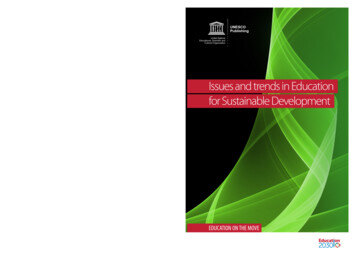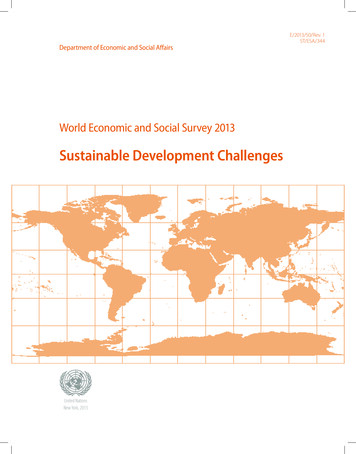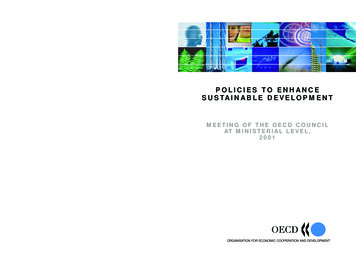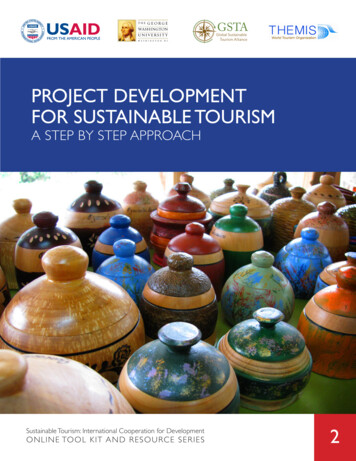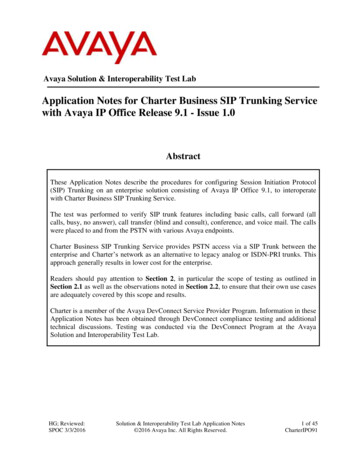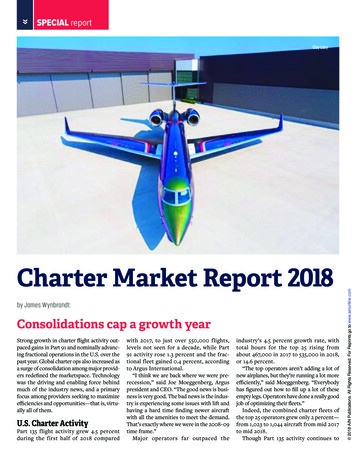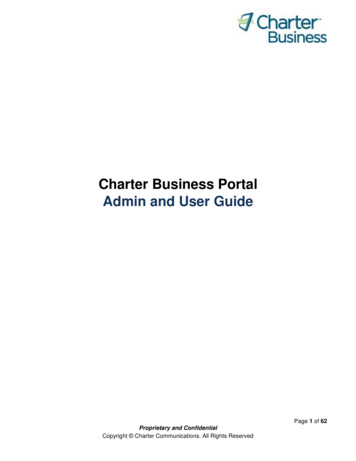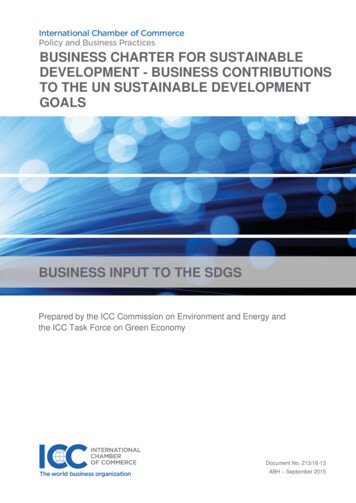
Transcription
BUSINESS CHARTER FOR SUSTAINABLEDEVELOPMENT - BUSINESS CONTRIBUTIONSTO THE UN SUSTAINABLE DEVELOPMENTGOALSBUSINESS INPUT TO THE SDGSPrepared by the ICC Commission on Environment and Energy andthe ICC Task Force on Green EconomyDocument No. 213/18-13ABH – September 2015
Business Charter for Sustainable Development - Business contributionsto the UN Sustainable Development GoalsDocument No. 213/18-13Table of ContentIntroduction . 2ICC Guiding Principles for Sustainable Development. 41. Sustainable development as a business priority . 42. Inclusive economic growth and development. 63. Environmental responsibility and management. 74. Responsibility towards people and societies . 85. Products and services . 106. Value-chain approach. 117. Transparency, communications and reporting . 138. Collaboration and partnerships for continuous improvement . 14Conclusion . 16Annex I: SME Policy Actions needed to support Sustainable Growth . 17Support for the Charter . 19The outlined linkages of the ICC guiding principles to the Sustainable Development Goals (SDGs) are based onthe ongoing discussions on the SDGs and their indicators, and are meant as a starting point. As the businesssector will further engage in the SDG discussions, the relation between goals and principles will be reassessed.Many companies are already addressing the challenges reflected in the SDGs. While these are universal, thebusiness contributions to the achievement of the SDGs may vary from sector to sector and value chain to valuechain, and according to national circumstances.International Chamber of Commerce 1
Business Charter for Sustainable Development - Business contributionsto the UN Sustainable Development GoalsDocument No. 213/18-13IntroductionSustainable economic growth provides the foundation and resources for societies to developand prosper, and for people to meet their needs and pursue their aspirations. It helps enableeconomic empowerment and poverty eradication, advance environmental stewardship; andcontribute to dealing with the trans-boundary global challenges highlighted by the UN SustainableDevelopment Goals.At the heart of economic growth are innovative, successful, and responsible businesses operatingwithin strong, forward-looking governance and policy frameworks.Now more than ever, sustainable development depends on the solutions, capabilities,contributions and engagement of business. ICC believes this entails: Innovation in all dimensions of sustainable development so as to develop more integratedstrategies, policy and decision-making. Leadership and collaboration to leverage the mutually-reinforcing and cross-cutting elements ofintegrated policy-making. Integrated governance structures fostering greater policy coherence between economic,environmental and development objectives. Efforts by all actors to reconcile short-term pressures with longer-term strategies to dealwith the multiplicity of economic, societal, and environmental challenges and opportunities in anintegrated manner. Bottom up and top down actions pursued simultaneously by governments and business insupport of sustainable growth. A one-size-fits-all approach will not be effective, nor will policiesthat work in silos. Multilateral and cross-cutting approaches across countries and sectors, which areindispensable in the global marketplace.ICC and sustainable developmentICC has played a long-standing role in promoting responsible business conduct and remainscommitted to providing through leadership to deliver sustainability solutions.In 1991, only four years after the milestone Brundtland report ―Our Common Future‖, ICC launchedits first Business Charter for Sustainable Development, voicing the first world business position onsustainable development. The Charter was subsequently updated in 2000 and 2015, with the latestversion reflecting the new approach to sustainable development and its economic, societal, andenvironmental dimensions.The 2015 Business Charter for Sustainable Development has been specifically designed to helpcompanies contribute to the SDGs’ implementation. Based around eight guidelines, it sets out astrategic framework to help companies place sustainability at the heart of their operations; it calls onthe widest range of enterprises to enhance their sustainability performance; it also calls for enhancedco-operation to support sustainable growth.International Chamber of Commerce 2
Business Charter for Sustainable Development - Business contributionsto the UN Sustainable Development GoalsDocument No. 213/18-13The Charter aims to: 12Reflect the Rio 20 outcome text, ―The Future We Want‖1 which acknowledges that sustainabledevelopment depends on the active engagement of both the public and the private sectors.Enable the global business community to contribute to the implementation of the UNPost-2015 Sustainable Development agenda and UN Sustainable Development Goals(SDGs).Build, inter alia, on ICC’s Green Economy Roadmap2, a guide for business, policy makers andsociety towards a greener and more sustainable economy.Work in harmony with existing practices, national and international guidelines, as well asstandards on all aspects of sustainability.Outcome document adopted at Rio 20 - ―The Future We Want‖: www.un.org/en/sustainablefuture/ICC Green Economy Roadmap: ation/Green-Economy-Roadmap/International Chamber of Commerce 3
Business Charter for Sustainable Development - Business contributionsto the UN Sustainable Development GoalsDocument No. 213/18-13ICC Guiding Principles for Sustainable Development341. Sustainable development as a business priority to recognize the business contribution to sustainable development as a key priority andan enabler for long-term business success.to build the necessary awareness and understanding amongst its employees,shareholders, customers, and other stakeholders.to clarify and integrate sustainability into its strategies, leadership principles, operations,activities and investments according to each business’ individually relevant context.to govern its business with integrity, develop best practices in any relevant area of work,and promote ethical conduct, including fighting corruption.Enhancing awareness and understanding of sustainability is vital to promoting priority setting in policymaking, as well as to helping enable sustainable development and growth. In this context, it isessential that all actors in the economy, including governments, intergovernmental bodies, business,civil society and consumers, see sustainable development and growth as a shared responsibility andthat they all take action as appropriate, locally and globally, for the challenges and benefitsassociated therewith to be, respectively, met and fully harnessed.In this context, business has an essential role to play in fostering sustainable growth, as well as adirect interest in helping bring solutions to global sustainability challenges. With a large range ofglobal business leaders already engaged in sustainability actions, it is critical that new forms ofinnovation and co-operation continue to be explored, both within the business community, as well asby and with governments, so as to accelerate and ultimately achieve the transition towards moresustainable growth patterns.As highlighted in the ICC Business Charter for Sustainable Development, taking into accountsustainability considerations can lead to improved business strategies and operations – as well asfoster innovation, enhance policy- and decision-making. In this respect, key benefits that businesscould harness include: Information clarity. Longer-term cost reductions. Reduction of risks and liabilities. Enhancement of awareness,knowledge, and education. Enhancement of efficiency and Increased employee loyalty.effectiveness of existing products. Generation of new business Higher standing in society and betteropportunities.reputational value.3ICC (2015). Business Charter for Sustainable Development. How to inspire and grow your business in the 21st century.4“Sustainable Development” from a policy maker perspective has been defined as ―meeting the needs of the present withoutcompromising the ability of future generations to meet their own needs‖, (Brundtland Commission, 1987).Sustainability or sustainable development in a business context is often seen as a process whereby companies seek to manage theirfinancial, societal (including governance) and environmental risks, obligations and opportunities. This is commonly referred to as a triplebottom line approach where business connects to healthy and balanced economic, societal and environmental systems. In order to do sobusinesses must be cognizant of the principles of sustainable development such as outlined in the ICC Charter, and consider their impactson the environment in which they operate.The term ‖sustainability/sustainable development‖ may be viewed as an umbrella term which includes other terms such as ―CorporateSocial Responsibility (CSR)‖, ―Environmental, Social, Governance (ESG)‖ or ―triple bottom‖ line.International Chamber of Commerce 4
Business Charter for Sustainable Development - Business contributionsto the UN Sustainable Development GoalsDocument No. 213/18-13Significant awareness of sustainability opportunities and challenges has already been raised withinthe global business community – companies, including employees, and business organizations alike.However, more needs to be done to mainstream awareness worldwide and to address allsustainability aspects. Business intra-industry, as well as collaborative actions that could beimplemented include: Enhancing global awareness regarding sustainability matters within companies and businessorganizations, employees and business partners.Fostering joint efforts to develop new business solutions.Promoting knowledge sharing and improved understanding of sustainability matters, forinstance through best practices sharing, or dissemination of easily understandable messages viadiverse communications tools.To operationalize the concept of sustainable development at the company level, its economic,environmental and societal aspects need to be embedded in global markets and appropriatelyreflected in business models and balance sheets. Steps that have been and/or could be taken bycompanies include: Developing innovative business models and enrolling interdisciplinary competence anddiversity to help shape better governance strategies at the corporate level.Setting company sustainability goals (e.g. reducing water, energy and raw materialconsumption) and fostering innovation.Activating skills that promote a more holistic and interdisciplinary thinking for businesssolutions in declining sectors, as well as in sectors adapting to a more sustainable economy.Exploring avenues to integrate all three dimensions of sustainable development intocorporate strategies.Enhancing stakeholder co-operation aimed at promoting sustainable procurement/purchasing5.Supporting efforts to equip the workforce with skills relevant to sustainable growth.Promote good corporate governance, that includes partnership approaches to fightingcorruption and contributing to the protection of human rights within business’ responsibilities6These actions can contribute to the following UN Sustainable Development Goals (SDGs)7: Goal 5: Achieve gender equality and empower all women and girls.Goal 8: Promote sustained, inclusive and sustainable economic growth, full employmentand decent work for all.Goal 12: Ensure sustainable consumption and production patterns.Goal 16: Promote peaceful and inclusive societies for sustainable development, provideaccess to justice for all and build effective accountable and inclusive institutions at alllevels.5By both organization and individuals/households, vis-a-vis products that are scientifically proven to have sustainability advantages, whileallowing access for companies of all sizes (e.g. cost neutral access possibility), see Green Economy Roadmap.6ICC has upheld a long-standing tradition at the forefront of the development of corporate governance, and tools, with the aim of helpingcompanies improve their governance performance. In this context, ICC combines leading cross-cutting and global expertise on a number ofcurrent issues, including anti-corruption anti-money laundering and counter-terrorist financing, relevant model contracts and clauses, and isbuilding on wide support received from business to advance the dissemination and implementation of the UN Guiding Principles onBusiness and Human Rights.7It should be noted that many companies have their own sustainable development goals on which they report their business activities. Thegoals below refer to the UN Sustainable Development Goals.International Chamber of Commerce 5
Business Charter for Sustainable Development - Business contributionsto the UN Sustainable Development GoalsDocument No. 213/18-132. Inclusive economic growth and development to promote business practices that contribute to economic growth in the direction ofsustainable developmentto encourage efficient and cost-effective policies and approaches that promoteentrepreneurship and empower and enable the establishment and start-up ofbusinesses.to ultimately contribute to the concept of decoupling2 economic activity from adverseenvironmental impacts, including new approaches to incorporate externalities3 ineconomic terms.Knowledge and skills integrating sustainable development management and business practices areincreasingly being developed, for individual businesses and the specific environment in which theyoperate. Business intra-industry and collaborative actions taken or that could be undertaken tofurther enhance such practices include: Developing and promoting inclusive business models meeting the needs of a moresustainable economy, in the context of poverty eradication.Promoting small business entrepreneurship and self-employment through innovativefinancing mechanisms, including micro-finance.Developing non-financial support mechanisms, such as advisory services, to encourage locallenders8, establish dedicated financial products, incentives, credit lines and pools of capital,targeting specific opportunities for more sustainable economies, such as partial credit guarantees,or co-financing guarantees for projects supporting sustainable growth.Developing innovative approaches to financing, such as partial risk-sharing mechanisms9,credit guarantees and co-financing, in order to reduce investment risks.Including financing and investment in national sustainable growth strategies and activelydriving investments in the direction of sustainable development.Increasing efforts to pool public funding in order to leverage private investment in supportof sustainable growth.Accelerating the development of products supporting sustainable growth, for instance bycombining private finance and access to public funds.In addition, methods and processes for sustainable investment should create global synergies forjoint investments – such as in urban planning and between different infrastructure supply systems.For a more sustainable economy to become operational, indicators, metrics, accounting measuresand better disclosures are critical. Yet, data for sustainability measures and indicators that arerigorous and meaningful in economic terms, while appropriately reflecting externalities, have not beenfully developed. Thus, better approaches to sustainability reporting are needed to help ensure that allrelevant actors have the necessary flexibility to reflect their particular circumstances10 and thatengagement in sustainability reporting be adequately supported. Against this background, businessintra-industry and collaborative actions taken or that could be undertaken include:89E.g. banks, institutional lenders and microfinance intermediaries in emerging markets.Including developing common methodologies or standards.International Chamber of Commerce 6
Business Charter for Sustainable Development - Business contributionsto the UN Sustainable Development Goals Document No. 213/18-13Initiating and further engaging in intra-industry collaboration to facilitate the development ofcommon methodologies, aimed at integrating externalities reflecting both environmental andequity considerations into wider value-chain strategies.Integrating externalities (in terms of costs and benefits)11 into corporate strategies andbalance sheets, while ensuring competitiveness and taking into account specific12 geographicalcircumstances.Reducing future business risk through greater risk analysis.These actions can contribute to the following UN Sustainable Development Goals: Goal 1: End poverty in all its forms everywhere.Goal 2 End hunger, achieve food security and improved nutrition and promotesustainable agriculture (indirectly)Goal 3 Ensure healthy lives and promote well-being for all at all ages (indirectly).Goal 4: Ensure inclusive and equitable quality education and promote lifelong learningopportunities for all.Goal 5: Achieve gender equality and empower all women and girls.Goal 8: Promote sustained, inclusive and sustainable economic growth, full employmentand decent work for all.Goal 11: Make cities and human settlements inclusive, safe, resilient and sustainable.Goal 12: Ensure sustainable consumption and production patterns.3. Environmental responsibility and management to recognize and assess environmental impacts associated with business activities.to implement an effective environmental management system to minimize actual andpotential adverse environmental impacts.to maximize resource efficiency of all natural resources, particularly water, energy andsoil.Shifting to more sustainable growth requires that the environmental footprint of economic activities befurther minimized and that the efficient use of natural resources be further enhanced. In this context,business is taking steps to improve ―life-cycle approach‖ metrics that also reflect externalities, as wellas to enhance product stewardship across value-chains. Business intra-industry and collaborativeactions taken or that could be undertaken to further enhance environmental management andresource efficiency include: 1112Adopting a value-chain approach, based on life-cycle thinking and focusing on resourceefficiency.Working within corporate value-chains to measure, manage and reduce environmentalimpacts, for instance of manufacturing activities, transport, distribution, as well as of end-ofproduct-life options.Providing incentives and policy guidance to drive efficiency in the use and re-use of allnatural resources (beyond carbon and energy).Ensuring access to sustainable resource use, and especially to sustainable use of scarceresources.i.e. negative and positive externalities.e.g., national, regional, sector specific.International Chamber of Commerce 7
Business
bottom line approach where business connects to healthy and balanced economic, societal and environmental systems. In order to do so businesses must be cognizant of the principles of sustainable development such as outlined in the

